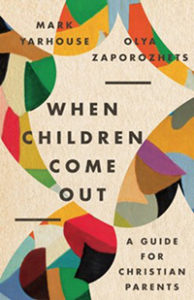When Children Come Out: A Guide for Christian Parents
Mark Yarhouse and Olya Zaporozhets (IVP Academic)
According to a 2021 Gallup poll, less than 5 percent of Boomers and Generation X, respectively, identify as LGBT+. By contrast, more than 10 percent of Millennials and more than 20 percent of Generation Z identify as such. Clearly, a person coming out as lesbian, gay, bisexual or transgender is and will be a much more common experience, including in Christian families. A book like When Children Come Out: A Guide for Christian Parents seems timely.
 Mark Yarhouse, professor of psychology at Wheaton College, has researched and written on sexuality and gender identity for many years. He and coauthor Olya Zaporozhets have collaborated on other projects, such as Costly Obedience: What We Can Learn from the Celibate Gay Christian Community.
Mark Yarhouse, professor of psychology at Wheaton College, has researched and written on sexuality and gender identity for many years. He and coauthor Olya Zaporozhets have collaborated on other projects, such as Costly Obedience: What We Can Learn from the Celibate Gay Christian Community.
The intended audience is the parent who wants to maintain relationship with a child who comes out, who wants to demonstrate unconditional love for that child, who does not want to be reactive or guided by fear and anger, and who is willing to accept the disclosure for what it is—a statement of identity. For parents who want to know they’re not alone, the book almost functions like a support group, though it is not meant as a substitute for one.
When Children Come Out is built on previous research that informs Yarhouse’s and Zaporozhets’ approach to parents’ concerns about their own responsibility for and response to their child’s sexual and/or gender identity. As with previous books, Yarhouse leads with description, which may frustrate parents eager for prescription. He and Zaporozhets relay what parents—most of whom hold or held traditional views of sexuality—say about what it was like when a child came out; what questions and feelings they had about themselves, their child and God; their experience seeking help; and what they experienced as they incorporated this new knowledge about their child into their lives.
When the authors do prescribe, they do not tell the reader what to think about sexuality. Instead, they relay what words and actions Christian parents said were helpful. The final chapter addresses churches through the same lens. As such, the prescription is largely experience-based, as opposed to Scripture-based.
The authors do not advocate trying to change a person’s sexual identity. Rather, they believe it best for parents to come to terms with what their children disclose. They make clear accepting a child’s sexual identity is not the same thing as affirming or agreeing with it. Without advocating for or rejecting affirmation, they view acceptance as necessary for maintaining parents’ relationship with their children.
Wherever a person stands on the matter of sexual identity, the fact growing numbers of people identify as LGBTQ+ means every parent—and church—should prepare for the possibility of a child coming out. They should ask themselves: What do I believe about sexuality, and why? What relationship do I want with my child, and why? When Children Come Out can be a resource for working through some of these questions.
Eric Black, executive director/publisher/editor
Baptist Standard















We seek to connect God’s story and God’s people around the world. To learn more about God’s story, click here.
Send comments and feedback to Eric Black, our editor. For comments to be published, please specify “letter to the editor.” Maximum length for publication is 300 words.